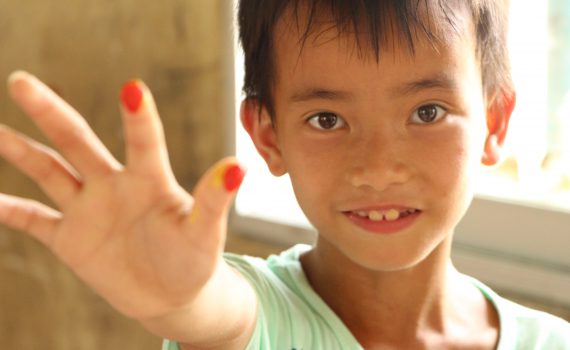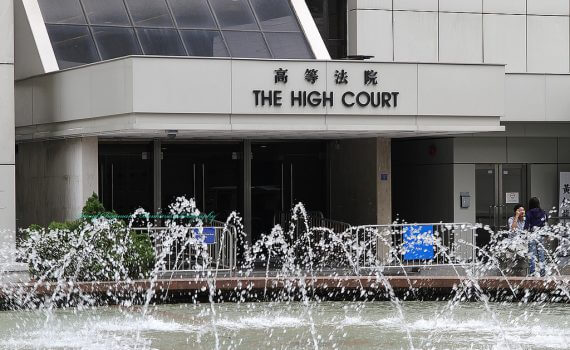By: Candice Wong、Erica ChinEdited by: Cecilia Wong

Children of asylum seekers deprived of education rights in Hong Kong
- 2017-12-30
- Society
- The Young Reporter
- By: Candice Wong、Erica ChinEdited by: Cecilia Wong
- 2017-12-30
Education expert and legislator call for conditional working rights of asylum seekers in supporting their own education expenses and daily expenses Isabella Ng Fung-sheung, assistant professor at The Education University of Hong Kong, volunteers at the Hong Kong Society for Asylum Seekers and Refugees. She said only one out of 170 asylum seekers can successfully make a non-refoulement claim so that they are not forced to leave the city. This process might take years, and their children may be deprived of their rights to education during the wait. Asylum seekers are not allowed to work in Hong Kong. Each person receives $1200 a month in food stamps from the government, which is enough for staple food but not much else, according to Dr. Ng. And while their children can go to school for free, Dr. Ng said asylum seekers often find it difficult to pay for school uniforms and books. Although most schools reimburse the parents for their expenses, they do have to pay upfront and then claim the money back with receipts. "Some families are not able to reach here for weekly gathering as they can't afford the transportation expenses," said Dr. Ng. Language barrier is also a major obstacle for young asylum seekers who desire education in Hong Kong, Dr. Ng stated. " The teacher kept telling me that this child cannot speak Chinese, can she understand at least one word of Chinese, if not, this child is so difficult to manage," said Dr. Ng when she recalled her experience in helping child asylum seekers searching for schools. " Local schools accept few non-Chinese speaking children," Dr. Ng says. " I tried to look for a kindergarten for a daughter of an asylum seeker once. She had a Hong Kong identity card, but eight out of ten schools …

Somewhere over the rainbow - How an 8-year-old boy experience China's education gulf
- 2017-12-30
- Society
- The Young Reporter
- By: Caroline KwokEdited by: Cecilia Wong
- 2017-12-30
Every morning at 8:30, the muddy ocher-coloured cottage is blasted with young voices reading aloud textbook passages, so loud that it can be heard across the cement-levelled playground far from the school gate. There are three classrooms in the cottage with no lights but a rickety ceiling fan each. Drawings are repeatedly glued on and ripped off a section of the wall framed with red rice paper. On top, it wrote sloppily "In Celebration of the June First International Children's Day". This is where the eight-year-old Huang Wei-biao goes to school every day with his 22 young schoolmates, a village in the rural area of the East Guangxi province. The nearest town is 45 minutes of serpentine car ride away. One can tell Huang is a diligent student as he reads his textbook with his finger precisely pointing at each word when he pronounces it. One can tell Huang is an assiduous child as the veins of his neck appear every time he utters a word. One can tell Huang is an eager learner as each page of his textbook is torn and curled at the corners. Yet no matter how earnest or smart a student Huang is, he is just one the 13.8 million village primary students in China who are probably receiving education of lower quality than students who study in the urban parts of China. Village schools lack facilities and professionally trained teachers. Pupils do not have classes in other areas such as arts and physical education, let alone school outings. In comparison, the XinXing primary school in the same prefectural city has a multi-story building with a sports ground. There are more than 40 teachers and most of them have received tertiary education. Children's' parents can also find better working opportunities close by and not have …

Highlights on Carrie Lam's responses in her press conference
- 2017-10-12
- Politics
- The Young Reporter
- By: Sharon PunEdited by: Isabella Lo
- 2017-10-12
Chief Executive Carrie Lam Cheng Yuet-ngor further justified her plans for Hong Kong in a press conference Wednesday afternoon, following the announcement of her first policy address in the morning. Responding to the saying that her policy address highlights only livelihood issues but avoids political matters, Lam said Hong Kong has not had a proper atmosphere for such a discussion yet. Lam mentioned the acts of some legislators that morning in the Legislative Council, which she considered as disrespect, are a sign indicating that the city is not ready for much political discussion. She said political reforms, especially those regarding Article 23 and universal suffrage, could only be progressed when time is suitable. Concerning measures to ease housing problems, Lam said the best way for now is to increase the supply of flat units. She promised to make transparent discussions in the near future to confirm how the schemes can work feasibly in detail. While public doubts if the "Starter Homes" plan could solve pressing issues related to housing soon, Lam clarified that it is more important to provide every the opportunity in purchasing flats. Another focus of Lam's address is regarding to innovation and technology. Lam agreed that the industry in Hong Kong has been lagging behind that in the Mainland for years. Apart from the increase in research and development funding, Lam said she will put in extra effort to this field by supervising the whole process of development herself. Regarding Hong Kong audience booing the national anthem at a football match on Monday, Lam thought the irrational audience are only the minority of the whole. She reaffirmed that Hong Kong is part of China and such acts are considered deeply disrespectful to the home country.

Decision was made out of "collective wisdom", the DR Group founder said
- 2017-09-21
- The Young Reporter
- By: Wing Li、Elisa LukEdited by: Daniel Ma、Celia Lai、Fred LAI
- 2017-09-21
The founder of DR Beauty Group should bear full responsibility for the whole incident, says the defence counsel of the group's technician in the hearing on Tuesday morning. Three defendants face charges of manslaughter regarding the death of a 46-year-old woman in 2012. The clinic head Stephen Chow Heung-wing, Chan Kwun-chung, a technician, and Mak Wan-ling, the patient's physician attended the hearing today. All of them pleaded not guilty. The defence counsel of Chan pointed out that Chow, who was also a doctor of the clinic, should be fully responsible since he was the one who made the decision of adopting CIK, a form of immunotherapy believed to be able to whiten and refine the skin. Chan's defence added that Chow made most of the decisions at the clinic, even the locations of the promotion posters. Chow denied the accusation and said most decisions were made by the whole central managerial team, claiming it was a common practice to make decisions with "collective wisdom". Meanwhile, Chow said he had appointed Chan to be in charge of the CIK treatment program. Chan's defence said Chan's Putonghua is "horrible" so he could not further enquire the supervisor at Guangzhou Military Hospital with the actual amount of cells needed for the treatment when they were learning about the CIK technology at the hospital . However, Chow responded that Li was able to communicate in Cantonese. Chow also could not answer the proper dosage and the frequency of injection when questioned by the judge. The trial continues on 16 Oct. [HCCC437/2015]

Conspiracy to make explosives hearing resumes as defence suspects insufficient evidence from police
- 2017-09-21
- The Young Reporter
- By: Erica Chin、Michael ShumEdited by: Isabella Lo、Cecilia Wong、Daisy Lee
- 2017-09-21
The defence council of the five males, accused of secretly making explosives in the abandoned ATV studio suspected the prosecution has brought insufficient evidence to court, heard in High Court on Wednesday. He questioned the sufficiency of evidence provided by the prosecution after cross-examining a CIB police officer who is the second witness. The officer told the court that he has not kept any records in words about their operations, only with his memory and audio reports. The prosecution refused to disclose how the oral report was recorded due to the risk of exposing confidential operation details in a public hearing when enquired by the defence. The defence suspected the police for providing insufficient evidence to the court after the prosecution suggested that a cousin document of the audio reports is available. The defence council doubted if the two CIB police officers could make a mistake on recognising the defendants. Defendants Chan Yiu-shing, 34, Cheng Wai-shing, 29, Pennelli Rizzy, 21, Wu Kai-fu, 21, Man Ting-lock, 23, was arrested after finding chemicals capable of producing explosives in former ATV premises in Sai Kung as police officers saw "yellowish white flashes" and smoke coming out from the building. The second CIB police officer told the court that they have been briefed by their superior Sgt. Lo Ka-shing of four male and two female as their targets, through the fourth defendant Wu Kai-fu was not one of their targets. "His [Wu's] name was not even known to the police before he was arrested," said the defence council of Wu, who also said it was a "chance encounter" for the police to have Wu arrested. Previous hearings revealed that Man Ting-lock, the fifth defendant, pleaded guilty and admitted that he has joined an anti-government organisation, "National Independence Party". They were experimenting with smoke bombs …

